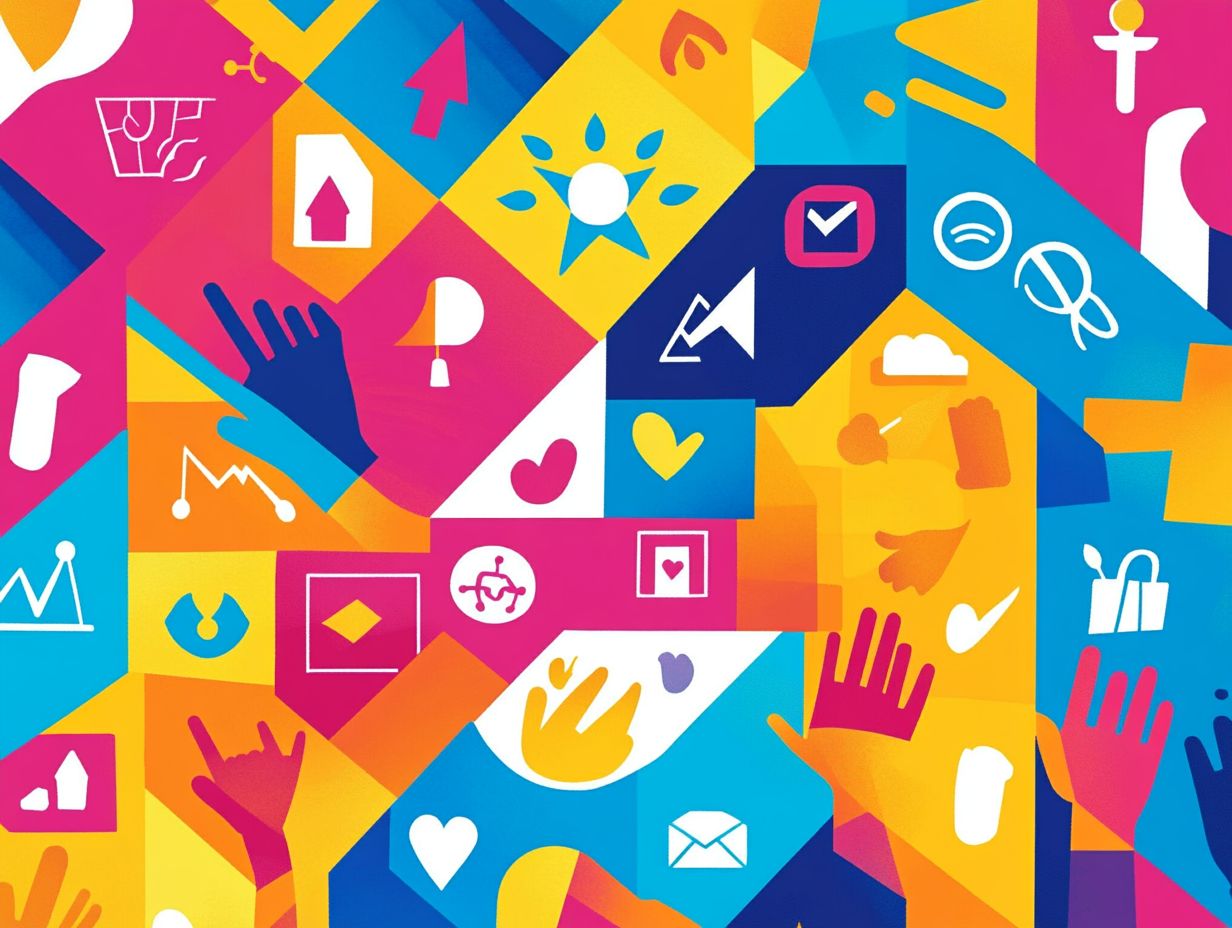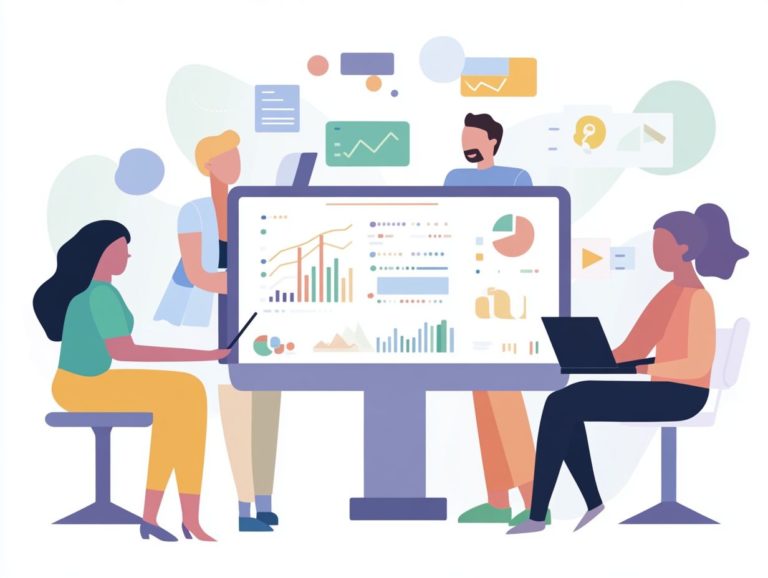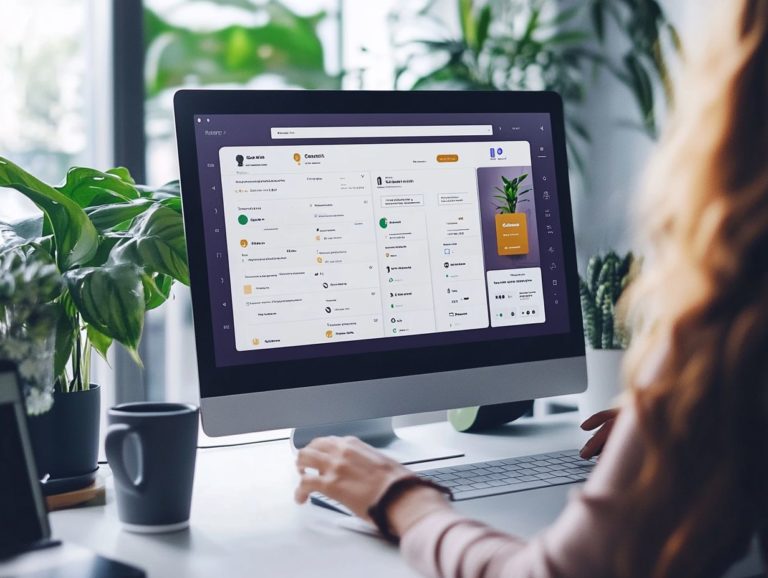10 Must-Use CRM Integrations for Nonprofits
In the ever-evolving landscape of nonprofit management, having the right tools at your disposal is crucial for achieving success. Discover how the right CRM tools can supercharge your nonprofit’s success! Customer Relationship Management (CRM) systems have become essential resources, empowering organizations to streamline operations, enhance donor engagement, and elevate fundraising efforts.
This article delves into ten must-use CRM integrations specifically tailored for nonprofits. We provide insights into their key features, benefits, and potential challenges.
Whether you re new to the world of CRM or seeking to optimize your existing systems, this guide will equip you with the knowledge you need to make informed decisions that propel your mission forward.
Contents
- Key Takeaways:
- 1. Salesforce
- 2. HubSpot
- 3. Zoho CRM
- 4. Blackbaud
- 5. DonorPerfect
- 6. NeonCRM
- 7. Kindful
- 8. Bloomerang
- 9. Salsa CRM
- 10. CiviCRM
- What Is a CRM Integration and Why Is It Important for Nonprofits?
- How Can a CRM Integration Benefit Nonprofits?
- What Are the Key Features to Look for in a CRM Integration for Nonprofits?
- What Are the Costs and Limitations of Using a CRM Integration for Nonprofits?
- How Can Nonprofits Successfully Implement a CRM Integration?
- What Are the Common Challenges Nonprofits Face When Using a CRM Integration?
- Frequently Asked Questions
- What are CRM integrations for nonprofits?
- Why are CRM integrations important for nonprofits?
- What are some common types of CRM integrations for nonprofits?
- What are the top 10 must-use CRM integrations for nonprofits?
- How do I choose the right CRM integrations for my nonprofit?
- Are there any costs associated with using CRM integrations for nonprofits?
Key Takeaways:
- Integrate Salesforce to maximize efficiency and enhance donor relationships!
- Improve communication and marketing strategies with HubSpot’s all-in-one CRM platform.
- Zoho CRM offers customizable solutions and automation tools for effective donor management and fundraising.

1. Salesforce
Salesforce distinguishes itself as a premier nonprofit CRM platform, specifically created to streamline your donor management and elevate donor retention. This enhancement ultimately improves your fundraising efforts.
With its comprehensive suite of tools, Salesforce enables you to manage supporter data with ease. This ensures that your relationships with donors are nurtured through personalized engagement strategies.
The system is packed with features tailored to meet the unique needs of nonprofit organizations. It offers robust donor profiles that track individual contributions and engagement history. This enables you to craft personalized communications that resonate.
Automation tools are at your disposal to alleviate administrative burdens. Streamlining repetitive tasks allows your team to concentrate on building meaningful relationships.
The platform offers advanced reporting tools. You can analyze fundraising performance precisely, guiding you to make informed decisions based on solid data.
By integrating with your existing donor databases, you not only centralize valuable information but also enhance the efficiency of your fundraising campaigns. This helps you achieve your mission with greater impact.
2. HubSpot
HubSpot provides a powerful CRM solution designed specifically for nonprofits. This allows you to enhance your donor communications and utilize segmentation tools to gain invaluable insights into your donor base, ultimately boosting engagement.
This platform features a user-friendly interface, making it accessible for organizations of all tech levels. Even if you don’t consider yourself particularly tech-savvy, its automation processes are game-changers.
These capabilities enable you to effortlessly track donation activities, promptly follow up with donors, and tailor your outreach efforts for a more personal touch.
By leveraging these tools, you can foster effective donor stewardship. This ensures that your supporters feel appreciated and well-informed. In the end, HubSpot not only streamlines your fundraising process but also enriches the relationships between your organization and its donors, enabling you to implement more effective fundraising strategies.
3. Zoho CRM
Zoho CRM offers you a versatile platform that captures engagement histories and communication metrics. This enhances your nonprofit’s donor interactions and elevates the overall donor experience.
By leveraging this robust system, you can effectively track individual donor preferences and contributions over time. For example, you can utilize donor data analytics to identify trends, such as peak giving periods or preferred communication channels.
This valuable insight enables you to tailor your fundraising campaigns, crafting personalized appeals that resonate with your supporters. Imagine if a donor consistently contributes during the holiday season! You can send targeted messages that highlight specific projects or needs aligned with that timeframe, fostering a deeper connection and increasing the likelihood of continued support.
With the right CRM solutions, your nonprofit can build lasting connections with donors and amplify your mission. Check out these essential CRM practices for nonprofits and start exploring these integrations today!
4. Blackbaud
Blackbaud is celebrated for its exceptional fundraising platform, particularly Raiser s Edge NXT. This tool helps you manage your donor database efficiently and elevates your fundraising efforts while enhancing donor engagement.
This platform streamlines donation tracking, enabling you to monitor contributions effortlessly. It also boasts robust reporting capabilities that provide deep insights into donor behavior and campaign performance.
When you bring all your important data together, it enables you to make informed decisions on cultivating relationships with major donor prospects.
The user-friendly interface simplifies launching and managing fundraising campaigns. This allows you to focus more on your mission and less on administrative tasks.
In the end, leveraging such comprehensive tools amplifies your outreach and maximizes your fundraising potential.
5. DonorPerfect
DonorPerfect presents a custom donor management system designed to enhance donor appreciation and boost retention. It offers nonprofits invaluable insights into their donor relationships.
With robust features, including custom reports and meticulous tracking of donor interactions, you gain a clear understanding of your fundraising dynamics. By harnessing these insights, you can develop personalized communication strategies that resonate deeply with your supporters.
Easily spotting trends in donor behavior allows you to segment your audience and design targeted campaigns. This approach refines your fundraising strategies and cultivates a stronger sense of community and partnership between your organization and its donors.
6. NeonCRM

NeonCRM is your go-to platform for nonprofits, designed to elevate online giving and nurture robust donor relationships. It highlights the critical role of centralizing data for effective supporter management.
By consolidating donor information into a single, user-friendly hub, this solution enables you to implement personalized engagement strategies that optimize your fundraising efforts.
With its advanced data analytics capabilities, you can track donor behaviors and trends effortlessly. This allows you to focus on specific segments with tailored campaigns.
Consider a charity analyzing past contributions to identify loyal donors. By reaching out with customized communications or exclusive invitations to special events, you cultivate deeper connections that encourage increased financial support.
This powerful data strategy drives revenue growth and strengthens the relationship between your organization and its supporters, creating a cycle of sustained generosity.
7. Kindful
Kindful is a premier nonprofit technology platform dedicated to enhancing donor communications and implementing effective engagement strategies. It aims to elevate your overall donor experience.
This platform provides a comprehensive suite of tools to track donor interactions meticulously. This allows you to gain deeper insights into your supporters and refine your fundraising efforts.
By recording communication preferences, you tailor your messaging to ensure it resonates with the unique desires of your donors. Such thoughtful engagement amplifies your campaigns effectiveness and cultivates long-lasting relationships, boosting donor retention.
When supporters feel valued and understood, they are far more likely to continue their contributions. Making informed communication an essential pillar of successful nonprofit strategies is crucial.
8. Bloomerang
Bloomerang helps nonprofits keep donors engaged. It offers insights into engagement histories and tools to build lasting relationships.
With detailed reports, you gain a clearer understanding of your supporters behaviors and preferences. Track interactions and measure engagement to create effective outreach strategies.
This approach boosts your fundraising efforts. Craft personalized messages that truly resonate with your donors.
By focusing on strong relationships, you cultivate loyalty and ensure long-term financial support for your mission.
9. Salsa CRM
Salsa CRM offers essential tools for fundraising and donor management. It helps enhance donor engagement through key communication metrics.
This platform lets you track donor interactions easily. As a result, you can build meaningful relationships over time.
With segmentation tools, you can group supporters based on their interests. This ensures your messages are relevant and impactful.
Salsa CRM streamlines your campaigns with data-driven insights. Personalize your outreach to elevate the donor experience.
This tailored approach encourages long-term support and turns occasional contributions into lasting partnerships.
10. CiviCRM
CiviCRM is a powerful tool for managing your donor database effectively. It offers comprehensive reporting to enhance fundraising efforts.
The platform simplifies donor management. You can easily track contributions and engage with supporters.
Centralizing data leads to insightful analytics. You can identify trends that guide your fundraising strategies.
Your team will benefit from automated workflows. This saves time and improves communication with donors.
You can analyze donor habits to tailor outreach. This strategy boosts retention rates and enhances your fundraising journey.
What Is a CRM Integration and Why Is It Important for Nonprofits?
CRM integration connects different software tools to streamline your data flow. It s vital for nonprofits looking to boost their fundraising efforts.
This integration centralizes supporter data and automates processes. You can gain insights into donor interactions, addressing common challenges.
Improved communication enhances donor engagement. Tailor your outreach strategies to create personalized experiences for your supporters.
When selecting a CRM, consider these best practices:
- Assess your specific needs.
- Ensure scalability for future growth.
- Prioritize user-friendliness for smoother team adoption.
Implementing integration involves training and establishing feedback loops. This allows continual refinement and improvement of your strategies!
How Can a CRM Integration Benefit Nonprofits?

A CRM integration can greatly enhance your nonprofit organization. It provides deeper donor insights, strengthens relationships, and streamlines communication tools, making it essential to explore the top 10 CRM integrations for better workflow.
With these insights, you can create personalized engagement strategies. These strategies improve donor retention and drive revenue growth.
Understanding donor preferences leads to meaningful connections. Such connections are essential for nurturing long-term loyalty.
Data analysis helps identify trends for impactful fundraising campaigns. This thoughtful approach significantly elevates the donor experience.
Ultimately, this strategy sets the stage for sustainable success in fulfilling your mission.
What Are the Key Features to Look for in a CRM Integration for Nonprofits?
When evaluating a CRM integration for your nonprofit, focus on key features. Consider looking into the 5 best CRM integrations for event management, as robust reporting, a comprehensive donor database, and effective fundraising tools are essential.
Segmentation tools allow you to categorize donors by giving history or interests. This helps craft tailored communications that resonate with individuals.
Incorporating donors’ communication preferences ensures your outreach is respectful. Whether it’s email, calls, or social media, your communication will be considerate.
This approach builds stronger relationships and enhances appreciation. It leads to increased retention and long-term support.
What Are the Costs and Limitations of Using a CRM Integration for Nonprofits?
Understanding the costs and limitations of CRM integration is crucial. These factors significantly influence donor management and fundraising efforts.
CRM systems can have complex cost structures. You ll need to consider both initial expenses and ongoing fees.
Hidden costs like training, maintenance, and data migration can add up. Don’t overlook these when budgeting.
Challenges such as ensuring compatibility with existing tools can complicate integration. Managing data security is also essential during this process.
These financial and operational considerations shape your donor retention strategies. It’s vital to use resources efficiently to build meaningful relationships with your supporters.
How Can Nonprofits Successfully Implement a CRM Integration?
Implementing a CRM integration requires careful planning. This ensures that your technology aligns with donor management goals and can significantly boost fundraising efforts, especially when utilizing the top 5 CRMs for nonprofit fundraising.
Start with a complete assessment of your current systems. Clearly define objectives that match your organization s mission.
Training your staff is crucial for effective use of the new tools. This will help integrate them into daily routines smoothly.
Careful data migration safeguards essential information. Organize and clean your current data before transferring it to the new CRM.
Once the system is in place, ongoing support is critical. This helps address challenges and make necessary adjustments.
Measuring engagement metrics and gathering donor insights is vital. It allows for continuous improvement in your fundraising strategies.
What Are the Common Challenges Nonprofits Face When Using a CRM Integration?
Nonprofits face various challenges when integrating a CRM. Key issues include data reporting, nurturing donor relationships, and adapting to new technology.
User adoption can be a significant hurdle. Staff may resist change, often due to unfamiliarity with new systems. Ensuring data accuracy is also essential, as inconsistent information can lead to misunderstandings and erode trust among donors.
Integrating with existing systems can also be a challenge. Achieving seamless connectivity can be complex and time-consuming.
Invest in training sessions to overcome these challenges and ensure a smooth transition for your team. Regularly auditing your data for consistency is crucial. Prioritize a CRM solution that offers straightforward integration options.
By adopting these best practices, you can enhance donor engagement and retention, ultimately fostering lasting relationships with your supporters.
Frequently Asked Questions
What are CRM integrations for nonprofits?

CRM integrations for nonprofits are tools that connect your organization’s systems, helping manage relationships with donors and supporters to other important software and platforms. Exploring essential CRM integrations for startups can streamline processes, improve efficiency, and enhance your nonprofit’s ability to engage with donors, volunteers, and stakeholders.
Why are CRM integrations important for nonprofits?
CRM integrations are crucial for nonprofits because they allow your CRM system to work seamlessly with tools like email marketing, fundraising platforms, and event management software. For a deeper understanding of the most effective options, check out the 5 best CRMs for nonprofits. This integration saves time, improves data accuracy, and enhances your organization’s overall effectiveness.
What are some common types of CRM integrations for nonprofits?
Common types of CRM integrations for nonprofits include:
- Email marketing
- Fundraising
- Event management
- Social media
- Volunteer management
These tools help better leverage your CRM system and improve communication with donors, volunteers, and other stakeholders.
What are the top 10 must-use CRM integrations for nonprofits?
The top 10 must-use CRM integrations for nonprofits are:
- Salesforce for Nonprofits
- Mailchimp
- DonorPerfect
- Eventbrite
- VolunteerMatch
- QuickBooks
- Google Analytics
- Classy
- Zapier
These 5 must-have integrations for your CRM platform offer various features and benefits, greatly enhancing your nonprofit’s CRM capabilities.
How do I choose the right CRM integrations for my nonprofit?
When choosing CRM integrations, consider your organization’s specific needs and goals. Identify the tools and software you currently use and where improved integration could be beneficial. Additionally, look into must-have CRM features for nonprofits by consulting your CRM provider or seeking recommendations from other nonprofits in your field.
Are there any costs associated with using CRM integrations for nonprofits?
Some CRM integrations may incur additional costs, but many offer free or affordable options for nonprofits. It’s important to look for features in nonprofit CRM that can help maximize value. Platforms may also provide discounts or special pricing. Research and compare your options to find the best fit for your organization’s budget and needs.
For further assistance, explore available CRM options or reach out for more information!






